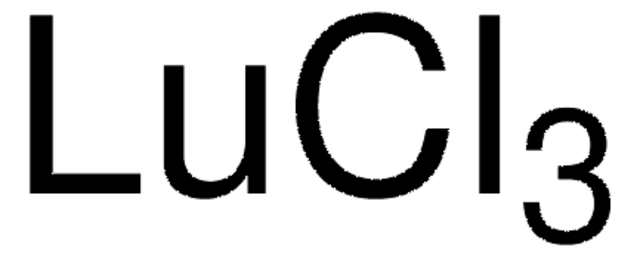451363
Yttrium(III) chloride
anhydrous, powder, 99.99% trace metals basis
Synonym(s):
Yttrium trichloride
About This Item
Recommended Products
grade
anhydrous
Quality Level
Assay
99.99% trace metals basis
form
powder
reaction suitability
reagent type: catalyst
core: yttrium
impurities
≤150.0 ppm Trace Rare Earth Analysis
mp
721 °C (lit.)
density
2.67 g/mL at 25 °C (lit.)
SMILES string
Cl[Y](Cl)Cl
InChI
1S/3ClH.Y/h3*1H;/q;;;+3/p-3
InChI key
PCMOZDDGXKIOLL-UHFFFAOYSA-K
Looking for similar products? Visit Product Comparison Guide
General description
Application
- Efficient sky-blue perovskite light-emitting diodes via photoluminescence enhancement: This study demonstrates how adding yttrium (III) chloride to a perovskite mixture enhances photoluminescence quantum efficiency, significantly improving the performance of perovskite light-emitting diodes (Wang et al., 2019).
- Yttrium complexation and hydration in chloride-rich hydrothermal fluids: A combined study using molecular dynamics and X-ray absorption spectroscopy to understand yttrium′s complexation and hydration in chloride-rich hydrothermal environments (Guan et al., 2020).
Features and Benefits
accessory
Signal Word
Danger
Hazard Statements
Precautionary Statements
Hazard Classifications
Aquatic Acute 1 - Aquatic Chronic 1 - Eye Dam. 1 - Skin Sens. 1B
Storage Class Code
13 - Non Combustible Solids
WGK
WGK 3
Flash Point(F)
Not applicable
Flash Point(C)
Not applicable
Personal Protective Equipment
Choose from one of the most recent versions:
Certificates of Analysis (COA)
Don't see the Right Version?
If you require a particular version, you can look up a specific certificate by the Lot or Batch number.
Already Own This Product?
Find documentation for the products that you have recently purchased in the Document Library.
Customers Also Viewed
Articles
Three approaches generate white light, including LED-based down-conversion for broader applications.
Rare earth elements are vital in everyday life worldwide: catalysts in cars, colors in screens, magnets in electronics. Essential for modern living.
Our team of scientists has experience in all areas of research including Life Science, Material Science, Chemical Synthesis, Chromatography, Analytical and many others.
Contact Technical Service




![Tris[N,N-bis(trimethylsilyl)amide]yttrium](/deepweb/assets/sigmaaldrich/product/structures/867/983/5b7cb7cd-8879-49e4-a9d7-29c52aaa82a0/640/5b7cb7cd-8879-49e4-a9d7-29c52aaa82a0.png)










